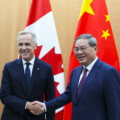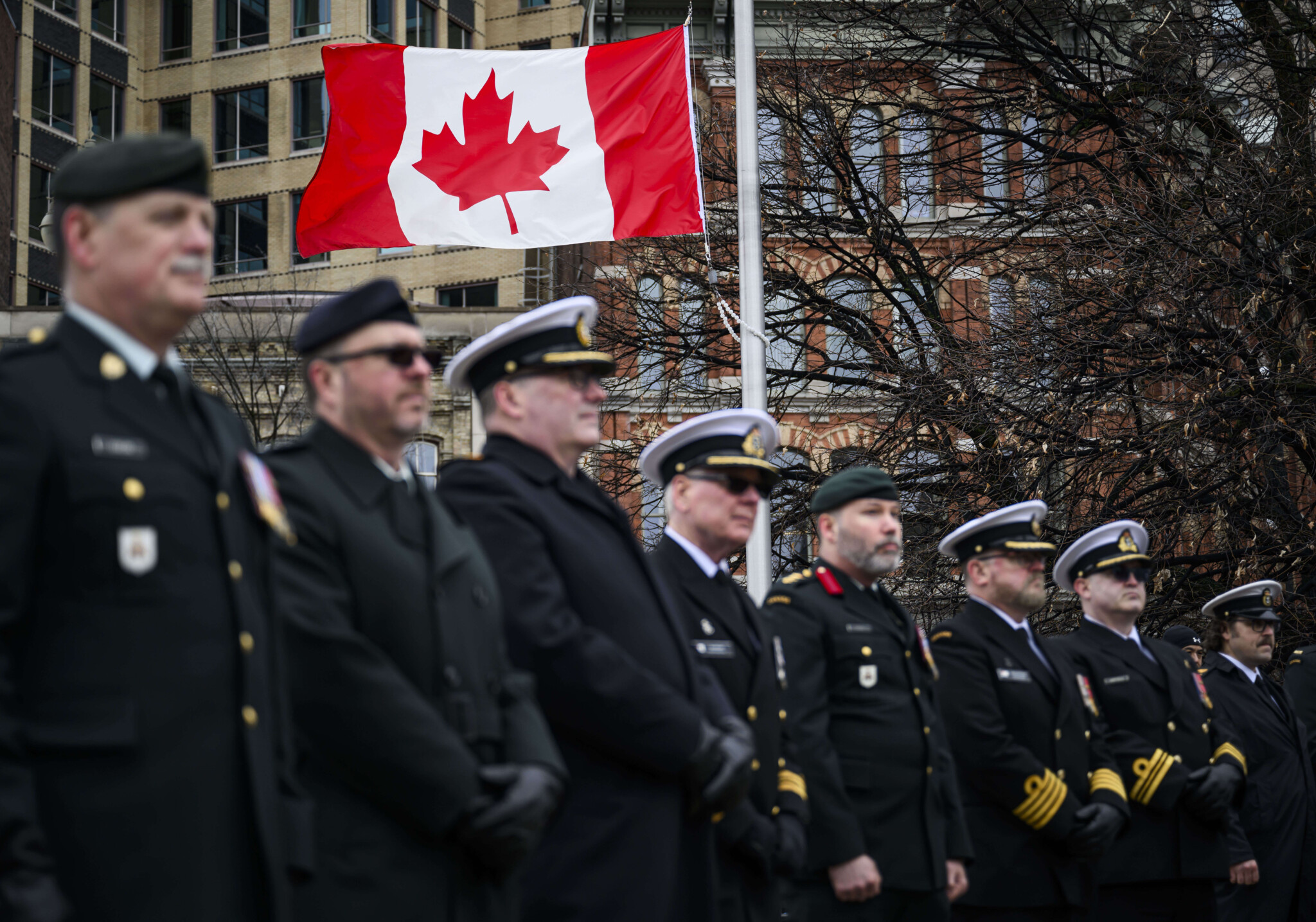In the face of global adversaries like Russia and China bent on hegemony and conquest, Canada’s hands-off approach to defence and security is no longer tenable. While the country itself has seemingly not woken up to this realization, its NATO and Western allies certainly have.
Canada‘s recent defence policy update, entitled “Our North Strong and Free: A Renewed Vision for Canada’s Defence” situated Canada’s defence strategy on a need to protect the Arctic and NATO’s northern flank. Sadly, all the document did was point out the obvious: Canada represents a great gaping hole in North America’s defences.
The title of the defence policy update is a play on the title of the Peter C. Newman book, True North Not Strong Not Free: Defending The Peaceable Kingdom in the Nuclear Age, which was a telling critique of the current prime minister of Canada’s father, Pierre Eliot Trudeau, and his defence policy throughout the late 1960s, 1970s, and early 1980s. Unfortunately, things have not much changed on the defence front with Trudeau the younger now in charge.
NATO’s Washington Summit is coming this July 9th to 11th in part to celebrate the 75th anniversary of the alliance, but also to discuss the international threat environment, Russia’s Ukraine war, and NATO member states’ readiness to defend alliance territory. One nation, Canada, stands out as the only NATO member state without a plan to reach the 2 percent of GDP spending goal and the only NATO country not able to spend 20 percent of its defence budget on capital.
Canada is the outlier on readiness and defence not because it is incapable of raising its defence spending—it is a G7 country with a top-ten largest economy in the world—but because it is unwilling to participate in the NATO goals it has signed on to. This is simply because its political leaders don’t want to, it faces no immediate consequences for not doing so, and it is happy to let others do the heavy lifting for them.
In fact, Canada seemingly has money for any social programme people care to name but will not spend what it needs to meet its NATO obligations that it sees as optional. Even though it signs on to NATO communiques agreeing to them, Prime Minister Trudeau has reportedly told allies that Canada has no intention of meeting the minimalist 2 percent of GDP goal. In terms of defence spending, Ottawa is now at 1.3 percent.
In fairness to the Trudeau government, it has finally joined the U.S. in the recapitalization and modernization of NORAD’s early warning system and Canada’s Royal Canadian Air Force with the purchase of new F-35 fighter planes, strategic Airbus tankers for in-flight refuelling, and P-8 Poseidon maritime patrol aircraft. The government has decided to purchase AWACS early warning aircraft in the recent defence policy update, but it will be several years, if not the end of the decade, before these systems can become operationalized and combat-ready capabilities to defend Canada’s North.
Until then we are forced to rely on an ageing CF-18 fighter fleet that was viewed in a recent Royal United Services Institute panel as a liability for NATO operations and elsewhere.
The long-neglected Royal Canadian Navy is a very different story. On the naval side, its offshore patrol vessels, even though brand new, are at best, a constabulary defence measure. Canada’s sub-surface fleet of 35-year-old diesel-powered Victoria-class patrol submarines spends more time out of the water than in the water, and its similar-aged surface fleet of frigates is nearing its end of life. None of these vessels can go under the icecap and chase Russian—and likely in the future Chinese—nuclear-powered submarines armed with ballistic and cruise missiles.
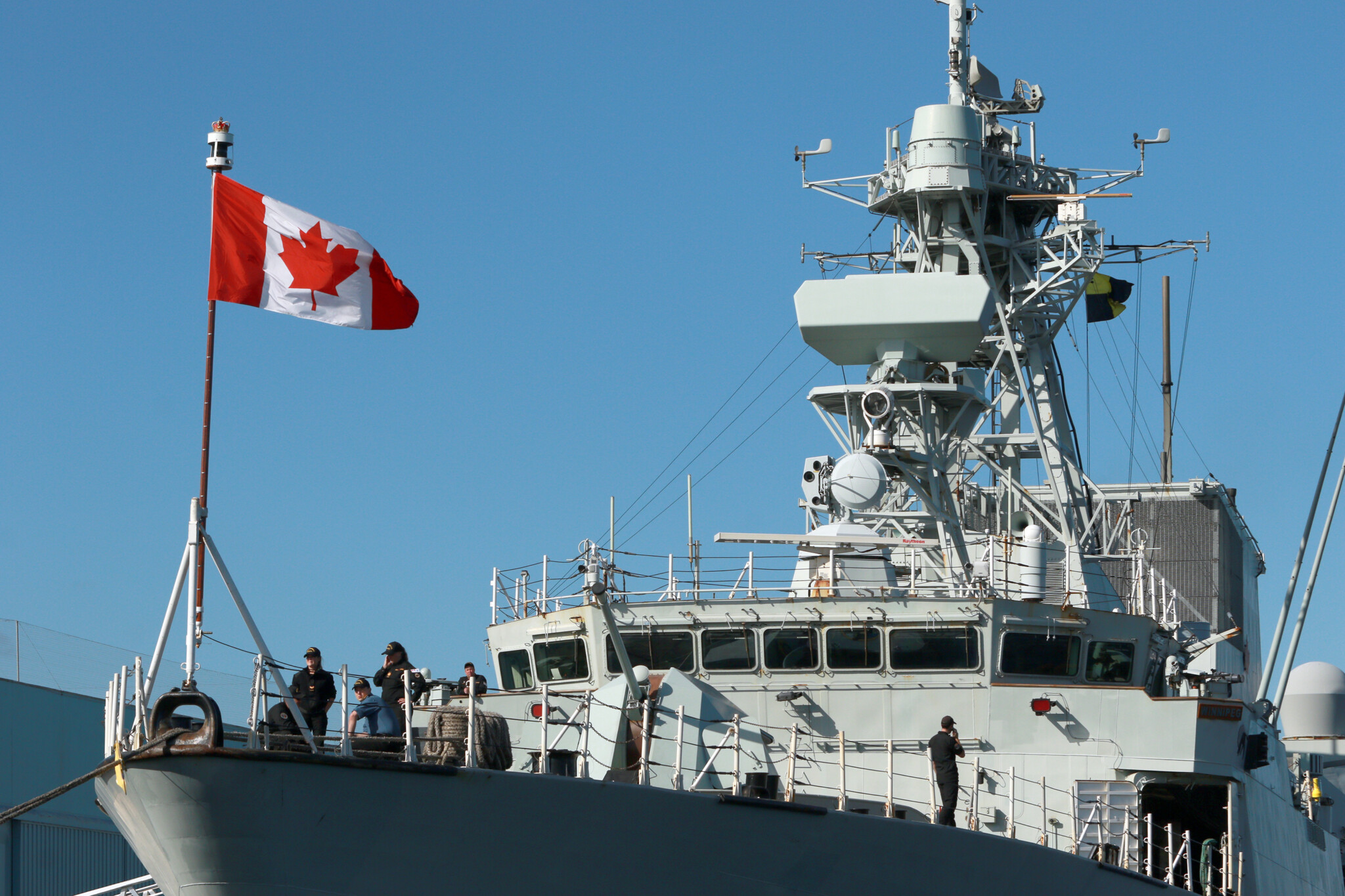
The HMCS Yellowknife, a Kingston-class coastal defence vessel during the Defence on the Dock at the Ogden Point Breakwater District in Victoria, Sunday, Sept. 17, 2023. Chad Hipolito/The Canadian Press.
The Canadian Army that served so ably and brilliantly in Afghanistan is forgotten about by the current government which sees them as nothing more than expensive labour to put out forest fires and fill sandbags. Once among the NATO experts in Arctic and winter warfare, Canada is a shadow of its former self. Expeditionary capability—the ability to reinforce NATO allies—was forgotten about in the defence policy update.
The Canadian Army is 8000-10,000 people short and lacks modern air and any tank defences, has no drone or counter-drone capabilities, and lacks a modern interoperable command, control, and communications system that can withstand Russian and Chinese electronic warfare capabilities. The Canadian Army is so stretched and under-equipped that it could not produce peacekeeping forces to take on the gangs in Haiti.
Canada is not in any sense prepared for Russian hybrid warfare or Chinese grey zone strategies and tactics in the rest of Canada, as its foreign interference public inquiry has shown, let alone Canada’s Arctic realm—the focal point of vulnerability of North America’s and NATO’s defences.
Canada will tell you that it found Chinese underwater surveillance devices in its northern waters and removed them, but its own coast guard put Chinese monitoring devices in the waters of its Pacific naval anchorage on behalf of a Chinese research project. As a Five Eyes intelligence community ally, it took years for Canada to ban Huawei from its future telecommunications network even though the Chinese intelligence threat was well understood. Ottawa closed down Chinese police stations in its largest cities only after they were publicly disclosed in the media and ignored a Chinese veterans association of the People’s Liberation Army that holds reunions in the country.
The Trudeau government has turned a blind eye for years to Parliamentarians working knowingly or unknowingly for foreign governments. Those are merely the things we know about because they have appeared in the media.
Canadians are facing an election perhaps two years down the road and we may very likely see a change in government, one with a much different attitude towards its defences. But as Canada dithers, the U.S. and NATO can’t wait two more years to shore up the Arctic defences so key to North American and NATO’s northern flank.
We have recently seen the U.S. and several NATO countries’ outspoken admonishments regarding Canada’s lack of interest in its allies’ collective security and defence in general. But the time has come for NATO member states to confront the Canadian government in Washington this July on its purposeful choice to allow a lack of military readiness, a choice that puts all NATO and Western allies at risk.
Canada at present is the Achilles heel of the NATO alliance and cannot be allowed to grow weaker. Insecurity and inaction are no longer viable options. The security and peace that we too often take for granted only comes through military strength and readiness. On this front, Canada cannot count on its allies to pick up its slack forever.
Recommended for You
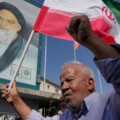
‘It was a harbinger’: How the 1979 Iranian Revolution still shapes the world
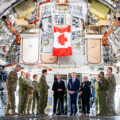
Can the new Defence Investment Agency fix Canada’s procurement problems—or will politics slow that down too?

Doubling Canada’s non-U.S. exports is actually easy

Need to Know: Over half of Palestinians say Hamas’ decision to launch the October 7 attacks was correct
